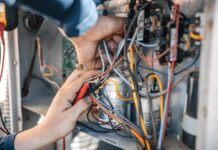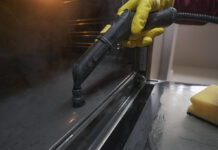A refrigerator is the heart of any kitchen, diligently keeping your food fresh and your drinks chilled. Yet, like any other appliance, it requires regular maintenance to function efficiently and extend its lifespan. This guide will walk you through essential refrigerator maintenance tips and the importance of knowing the average lifespan of a fridge, ensuring your appliance remains in top condition for years to come.
Regular Cleaning
- Interior Cleaning: Start by emptying your fridge and removing all shelves and drawers. Wash these components with warm, soapy water, then rinse and dry thoroughly before placing them back. Wipe down the interior walls and door seals with a mixture of water and baking soda to eliminate odours and bacteria.
- Exterior Cleaning: Don’t forget to clean the exterior, especially the door handles which are high-touch areas. A mild detergent will suffice for this task.
- Condenser Coils: These coils are located either at the back or beneath your fridge. Dust and debris can accumulate over time, reducing efficiency. Use a vacuum or a coil brush to clean them every six months.
Temperature Check
Maintaining the correct temperature is crucial for food safety and energy efficiency. The ideal temperature for the refrigerator compartment is between 37°F (3°C) and 40°F (4°C), while the freezer should be set to 0°F (-18°C). Use an appliance thermometer to check these settings periodically.
Door Seals
Door seals, or gaskets, are vital for maintaining the internal temperature of your fridge. Over time, they can wear out, allowing cool air to escape. Test the seals by closing the door on a piece of paper. If you can pull the paper out easily, it’s time to replace the gasket. Clean the seals regularly with warm, soapy water to prevent dirt build-up.
Defrosting the Freezer
Modern refrigerators are often frost-free, but if yours isn’t, regular defrosting is necessary to prevent ice build-up, which can affect efficiency and storage space. Follow the manufacturer’s instructions on how to defrost your freezer safely.
Water Filters
If your refrigerator has a water dispenser or ice maker, it likely has a water filter. These filters need to be replaced every six months to ensure clean, fresh-tasting water. Consult your fridge’s manual for specific replacement instructions.

Noise Levels
Unusual noises can be an early warning sign of problems. Listen for humming, rattling, or buzzing sounds. If you notice any unusual sounds, consult a professional to diagnose and fix the issue before it becomes a major problem.
Keep it Well-Stocked
A well-stocked refrigerator is more efficient than an empty one. The thermal mass of the food helps maintain a stable temperature. However, avoid overloading it, as this can obstruct air vents and reduce cooling efficiency.
Professional Maintenance
While regular at-home maintenance is crucial, it’s also wise to schedule professional check-ups. A technician can inspect components that aren’t easily accessible, such as the refrigerant level and compressor function.
The Lifespan of Your Refrigerator
Maintaining your fridge properly can significantly extend its life. On average, a refrigerator lasts about 10-15 years – however, even with the best care, there comes a time when replacement is necessary.
By following these tips, you can keep your fridge running smoothly and your food fresh, contributing to a well-organised and functional kitchen. If you ever encounter issues beyond routine maintenance, don’t hesitate to seek professional help to keep your appliance in optimal condition.

















